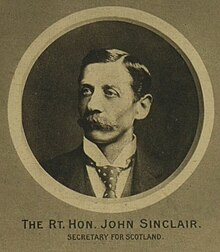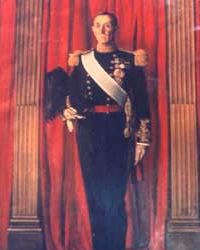The Lord Pentland | |
|---|---|
 | |
| Governor of Madras | |
| In office 30 October 1912 – 29 March 1919 | |
| Governors‑General | The Lord Hardinge of Penshurst The Viscount Chelmsford |
| Preceded by | Sir Murray Hammick (acting) |
| Succeeded by | Sir Alexander Gordon Cardew (acting) |
| Secretary for Scotland | |
| In office 10 December 1905 – 13 February 1912 | |
| Preceded by | The Marquess of Linlithgow |
| Succeeded by | Thomas McKinnon Wood |
| Member of Parliament for Forfarshire | |
| In office 1897–1909 | |
| Monarchs | Victoria of the United Kingdom, Edward VII of the United Kingdom |
| Preceded by | Martin White |
| Succeeded by | James Falconer |
| Member of Parliament for Dunbartonshire | |
| In office 1892–1895 | |
| Monarch | Victoria of the United Kingdom |
| Preceded by | Sir Archibald Orr-Ewing, 1st Baronet |
| Succeeded by | Alexander Wylie |
| Personal details | |
| Born | 7 July 1860 |
| Died | 11 January 1925 (aged 64) United Kingdom |
| Political party | Liberal Party |
| Spouse | Marjorie Adeline Gordon |


John Sinclair, 1st Baron Pentland, GCSI, GCIE, PC (7 July 1860 – 11 January 1925) was a British politician in the Scottish Liberal Party, a soldier, peer, administrator and Privy Councillor who served as the Secretary of Scotland from 1905 to 1912 and the Governor of Madras from 1912 to 1919.
Baron Pentland was born John Sinclair to George Sinclair (1826-1871) son of Sir John Sinclair, 6th baronet of Dunbeath. He studied in the United Kingdom and in 1892, entered the House of Commons as an elected Member of Parliament (MP) for Dunbartonshire. He was elected for a second term from Forfar in 1897 and served in the British Parliament from 1892 to 1895 and 1897 to 1909. He also served as an Aide-de-Camp and secretary to Lord Aberdeen. Sinclair was appointed to the Privy Council in 1905. He served as the Secretary for Scotland from 1905 to 1912 and as the Governor of Madras from 1912 to 1919. He died in 1925.
During his tenure as Governor of Madras, Pentland became popular in India for the interest he showed in the indigenous tradition and culture. At the same time, he is also remembered for his crackdown on Annie Besant and leaders of the Home Rule Movement.
A radical Liberal,[1] Sinclair was supportive of reforms aimed at promoting social justice. As noted by Veronica Strong-Boag
"As much as anyone in the new Cabinet after the 1905 election, he embodied the new liberalism of state intervention on the side of the weak. He was also a staunch proponent of legislation tailored to Scottish circumstances. His advocacy of the Scottish Education Act of 1908, which provided for improved teacher training and school facilities and meals for students, very much followed the spirit of Lord Aberdeen’s practices on his own estates. So, too, did Sinclair’s support for legislation to secure the land rights of Scottish crofters."[2]
- ^ Paterson, Lindsay (2003). Scottish Education in the Twentieth Century. ISBN 9780748615902.
- ^ Strong-Boag, Veronica (January 2015). Liberal Hearts and Coronets: The Lives and Times of Ishbel Marjoribanks Gordon and John Campbell Gordon, the Aberdeens. ISBN 9781442626027.